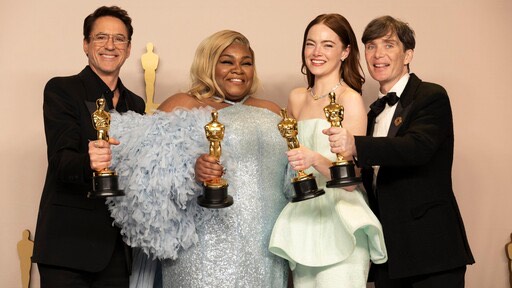
This snippet of Merv Griffin’s interview with Francis Ford Coppola, from 1979, a few months after the release of “Apocalypse Now” touches on some pretty crucial issues regarding moviemaking, then and now. The first thing that Griffin asked him—quite logically—concerned the grand scale of Coppola’s filmmaking (“You’ve always done things in a very big way”). Coppola agrees, explaining that movies have to have “quality and integrity because they have such a tremendous influence on the world and on people.” The argument is a fascinating one—he felt that his power to make movies that were widely seen placed a moral obligation on him to affect people in ways he considered worthwhile, and part of that influence involved craft or finish—what might be called high production values, which take big budgets to realize. At the same time, “integrity” implied his own integrity, the sense that he was telling the story as he imagined it, that the movie that came out resembled his vision of it going in—which entails a scale of onscreen action proportionate to the scale of the story being told.
The question comes up in a fascinating article by my colleague David Denby, in The New Republic, about the state of moviemaking today. David is concerned about the studios’ unwillingness to spend lavishly on productions of substantial projects by the leading filmmakers of the time (he cites some names—Martin Scorsese, Steven Soderbergh, David O. Russell, Kathryn Bigelow, Noah Baumbach, David Fincher, Wes Anderson, Terrence Malick), the problem being: “not everything a film artist wants to say can be said with $3 million…. They can work if they want to, but only on very small budgets.”
David’s argument has a moral tack as well, involving the switch in the industry away from movies “essentially made for adults” (though I’d add that, alongside the many great movies of the high-studio era, plenty of others from that time did a pretty good job of kidding adults along with their bland sentimentality and tightly normative narrowness). Of course, in many ways, the overall center of cultural gravity (or levity) headed toward adolescence, and did so in popular music decades before it did in movies, so the question at hand really is broadly cultural, even political (after all, the Greatest Generation that beat the Nazis eight to the bar played out their nostalgic cultural and political fantasies in Vietnam). But the studio filmmakers who enjoyed the full-scale industrial production that went with often-lavish studio budgets were the studios’ employees. They faced the moral risk that all artists face of confronting their own limitations, but they didn’t face any financial ones.
Coppola did, and still does. He pursued with Griffin the theme of his “big ways,” adding,
I believe that filmmaking—as, probably, is everything—is a game you should play with all your cards, and all your dice, and whatever else you’ve got. So, each time I make a movie, I give it everything I have. I think everyone should, and I think everyone should do everything they do that way.
He said that “Apocalypse Now” cost $31 million to make; Griffin asked whether he feared bankruptcy in case of a box-office disaster. At first, he says that he had nothing to fear, because he knew he could easily get hired as a directorial hired gun and quickly earn back whatever he might have lost—“so it would be a sin for me not to risk what I had earned, because I can make it back again”—and that, in any case, though he actually did fear losing his house, he also knew that George Lucas had promised that, if all went sour, he’d buy the house and allow Coppola to live there while paying him back.
One of the keys to the current trend toward lower budgets for Hollywood projects of personal commitment is that they’re made like independent films (which explains the ridiculous crossover between the Oscars and the Independent Spirit Awards). When Darren Aronofsky made “Black Swan” he and his actors sacrificed upfront pay for a percentage of the gross; when Steven Soderbergh made “Magic Mike” he did it on his own dime. Though there’s no inherently greater merit to sharing a movie’s financial risk, doing so gives directors a measure of practical freedom that also makes their connection to the practical results all the more tangible and personal—and I suspect that the powerful sense that these films offer of live-wire contact with an audience is a result of the filmmakers’ existential commitment to their creation.
When I had the privilege of talking with Jean-Luc Godard in 2000, he divulged to me his own formula for the directorial fountain of youth. We were talking about the later films of great Hollywood directors whose careers managed to survive the collapse of the studio system—such films as Alfred Hitchcock’s “Marnie” Howard Hawks’s “El Dorado” and John Ford’s “Cheyenne Autumn”. He said that what distinguished the filmmakers who were able to keep going was that they were also producers with their own production companies—“that’s why they were able to manage, like me, I’ve got my production company.” I doubt that any of these four filmmakers put up the bulk of the capital for their films, but, rather, they managed financiers’ or studios’ investments, and had a hands-on relationship to the film’s finances.
That sense of management is closely connected to Coppola’s devotion to “quality and integrity”; the bigness of a production is, above all, the control of time, the director’s ability to do as many takes as desired or to shift the course of production midstream (to change script, location, even actors) without answering to a higher authority. Coppola, speaking with Griffin about “Apocalypse Now” said that the Vietnam War was a subject of such intrinsic importance that he made sure “that it would be beautiful and that it would in some way throw light on the subject.”
This, I think, is the underlying engine of David’s lament—the desire to see popular filmmaking that wrestles with political history on the wing with the kind of grand-scale audacity shown by Coppola, or by Chaplin with “Modern Times” and “The Great Dictator”. But these filmmakers are precisely the independents, the ones who had their own money in their movies. There is such a thing as historical audacity on a tight budget and an intimate scale—I went into detail about it here a few years ago. But the ultimate question is power—not so much the assimilation of movies to the journalistic and political discourse of the times as the assumption by moviemakers of its position. Francis Ford Coppola, one of the great filmmakers of the era, has wrestled for decades with the agony of falling just short of the highest office. It’s as if he ran for President three decades ago and lost, and has struggled with that failure ever since, without going far enough afield to find new things to do. His story is a true tragedy.
Culled from The Newyorker.











Nice post. I learn something totally new and challenging on sites I stumbleupon on a daily basis. It will always be useful to read content from other writers and practice something from other web sites.
Thank you for your comment.